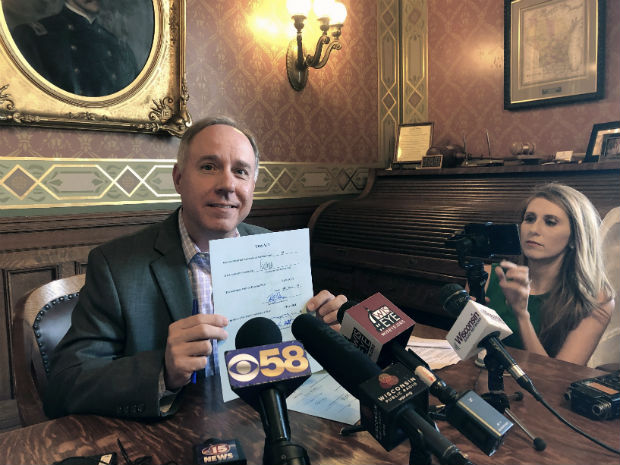Evers under pressure to sign Wisconsin budget
By: Associated Press//July 1, 2019//

By SCOTT BAUER
Associated Press
MADISON, Wis. (AP) — Gov. Tony Evers was under pressure Monday to sign the state budget as passed by the Republican-controlled Legislature, even though it doesn’t include many of his priorities and GOP lawmakers have made it difficult for him to use partial vetoes to reshape it.
Republicans have been calling on Evers to sign the nearly $82 billion budget, saying it’s the best compromise possible. Similar encouragement came on Monday from a group representing long-term-care centers in Wisconsin.
Some liberals, meanwhile, called on Evers to veto the entire two-year spending plan — which would be an unprecedented step since Wisconsin began having budgets that cover a two-year period. Evers has said he would consider rejecting Republicans’ entire plan.
LeadingAge Wisconsin came out on Monday in favor of Evers’ signing the plan. The group represents more than 200 nursing homes, centers for the developmentally disabled, independent- and assisted-living centers, and community-service agencies. It cited the nearly $234 million more the budget would set aside for long-term care as a reason for Evers to sign the plan into law.
“This significant two-year investment will help tremendously in addressing historically inadequate Medicaid rates that have contributed to nursing facility closures and challenges in recruiting and retaining high quality caregivers,” said John Sauer, head of LeadingAge Wisconsin in a statement.
The additional money the budget would set aside for health care — about $588 million — is just one cause of the dilemma that Evers is faced with. One of the governor’s biggest priorities has long been finding ways to spend more on health care. Republicans found a way to take such a step without allowing more people to use Medicaid and accessing $1.6 billion in federal funding, both steps Evers had proposed.
Evers campaigned on expanding Medicaid and many Democrats believe it helped push him to victory over Scott Walker, a longtime opponent of accepting the federal money.
The budget passed by Republicans differs in many other significant ways from what Evers had proposed.
Spending would increase on K-12 schools and the University of Wisconsin, but not as much as Evers had wanted. Republican called for a $450 million income-tax reduction for the middle class, a proposal that’s smaller than Evers’ own proposal and would not be paid for by raising taxes on manufacturers. And instead of raising gas taxes to pay for roads, Republicans would increase vehicle-licensing and registration fees.
The budget would increase spending by nearly 6%, which would be less than was allowed in any budget passed under Walker and less than the more than 8% Evers had proposed. However, the nonpartisan Wisconsin Policy Forum noted on Monday that if Republicans’ proposed budget were passed with no changes, the state’s main account — known as the general fund — would be left with the lowest balance since 2011.
That smaller financial cushion would make the next state budget harder to balance and weaken the state’s ability to deal with the next recession, the group said.
Evers has until Friday to take action on the budget. He has not yet said whether he will sign it with partial vetoes, or veto the entire spending plan. His spokeswoman, Melissa Baldauff, had no immediate comment on Monday.
Several budget provisions added by Republicans may be ripe for a veto. They include a last-minute addition used to secure the vote of Republican Sen. Chris Kapenga by allowing the electric-car manufacturer Tesla to sell directly to customers in Wisconsin, rather than going through a dealer.
Republicans also included $5 million to begin the replacement of the Green Bay Correctional Institution, money Evers had not put in the plan. Town officials have also spoken out against a GOP provision that would restrict local governments’ authority to oversee quarries.
The previous state budget, signed by Walker, ended on Sunday but remains in effect until a new one is signed into law. However, during that time no spending increases approved under the pending budget would take effect.
Legal News
- Former law enforcement praise state’s response brief in Steven Avery case
- Eric Toney announces re-election bid for Fond du Lac County District Attorney
- Former Wisconsin Democratic Rep. Peter Barca announces new bid for Congress
- Republicans file lawsuit challenging Evers’s partial vetoes to literacy bill
- More human remains believed those of missing woman wash up on Milwaukee Co. beach
- Vice President Harris returning to Wisconsin for third visit this year
- Wisconsin joins Feds, dozens of states to hold airlines accountable for bad behavior
- Trump ahead of Biden in new Marquette poll
- Bankruptcy court approves Milwaukee Marriott Downtown ‘business as usual’ motion
- New Crime Gun Intelligence Center to launch in Chicago
- Arrest warrant proposed for Minocqua Brewing owner who filed Lawsuit against Town of Minocqua
- Wisconsin Supreme Court justices question how much power Legislature should have
WLJ People
- Power 30 Personal Injury Attorneys – Russell Nicolet
- Power 30 Personal Injury Attorneys – Benjamin Nicolet
- Power 30 Personal Injury Attorneys – Dustin T. Woehl
- Power 30 Personal Injury Attorneys – Katherine Metzger
- Power 30 Personal Injury Attorneys – Joseph Ryan
- Power 30 Personal Injury Attorneys – James M. Ryan
- Power 30 Personal Injury Attorneys – Dana Wachs
- Power 30 Personal Injury Attorneys – Mark L. Thomsen
- Power 30 Personal Injury Attorneys – Matthew Lein
- Power 30 Personal Injury Attorneys – Jeffrey A. Pitman
- Power 30 Personal Injury Attorneys – William Pemberton
- Power 30 Personal Injury Attorneys – Howard S. Sicula











